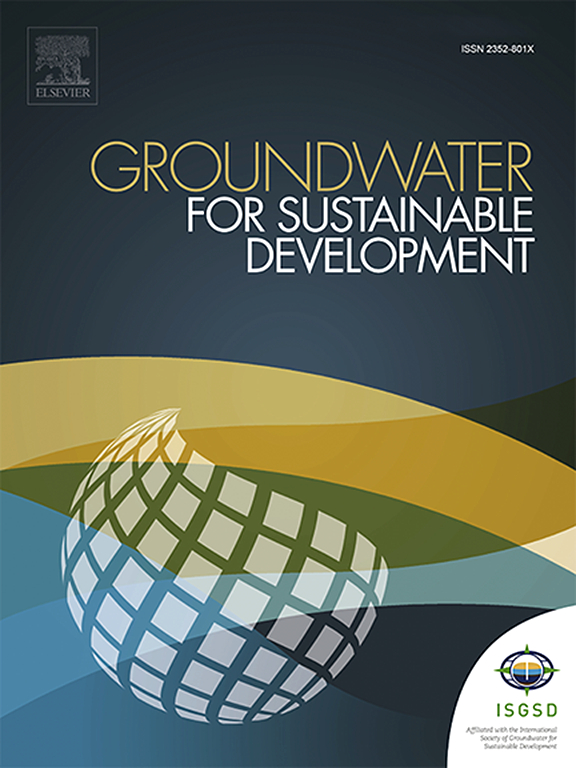Mitigating nitrate contamination in groundwater: A comprehensive review of in-situ approaches
IF 4.9
Q2 ENGINEERING, ENVIRONMENTAL
引用次数: 0
Abstract
Groundwater nitrate contamination remains a critical global environmental and public health challenge, driven primarily by agricultural activities, industrial discharges, and urbanization. This review paper comprehensively analyze in-situ approaches for mitigating nitrate contamination, including bioremediation, permeable reactive barriers, and advanced catalytic techniques. It highlights the evolution of these methods, focusing on their effectiveness, scalability, and sustainability. While significant advancements have been made, critical gaps persist in addressing long-term efficiency, cost-effectiveness, and adaptability to diverse hydrogeological settings. Emerging trends, such as the application of bioengineered microorganisms, nanomaterials, and data-driven optimization strategies, are explored for their potential to overcome these challenges. The paper also emphasizes the influence of regulatory frameworks, climate change, and technological innovation on developing sustainable nitrate mitigation strategies. Future research should integrate multidisciplinary approaches to develop robust, site-specific solutions, using advanced monitoring technologies for real-time contaminant tracking and refining eco-friendly materials for enhanced reactivity and durability. This review aims to provide a roadmap for advancing the design and implementation of innovative, in-situ nitrate mitigation techniques by synthesizing current knowledge and identifying future priorities.

减少地下水中的硝酸盐污染:原位方法的综合综述
地下水硝酸盐污染仍然是一个重大的全球环境和公共卫生挑战,主要是由农业活动、工业排放和城市化造成的。本文从生物修复技术、渗透反应屏障技术和先进的催化技术等方面全面分析了硝酸盐污染的原位缓解方法。它强调了这些方法的演变,重点是它们的有效性、可扩展性和可持续性。虽然取得了重大进展,但在解决长期效率、成本效益和对不同水文地质环境的适应性方面仍然存在重大差距。新兴趋势,如生物工程微生物、纳米材料和数据驱动的优化策略的应用,探索了它们克服这些挑战的潜力。本文还强调了监管框架、气候变化和技术创新对制定可持续硝酸盐减缓战略的影响。未来的研究应该整合多学科方法来开发强大的、特定地点的解决方案,使用先进的监测技术来实时跟踪污染物,并精炼生态友好的材料,以增强反应性和耐久性。本综述旨在通过综合现有知识和确定未来的优先事项,为推进创新的原位硝酸盐缓解技术的设计和实施提供路线图。
本文章由计算机程序翻译,如有差异,请以英文原文为准。
求助全文
约1分钟内获得全文
求助全文
来源期刊

Groundwater for Sustainable Development
Social Sciences-Geography, Planning and Development
CiteScore
11.50
自引率
10.20%
发文量
152
期刊介绍:
Groundwater for Sustainable Development is directed to different stakeholders and professionals, including government and non-governmental organizations, international funding agencies, universities, public water institutions, public health and other public/private sector professionals, and other relevant institutions. It is aimed at professionals, academics and students in the fields of disciplines such as: groundwater and its connection to surface hydrology and environment, soil sciences, engineering, ecology, microbiology, atmospheric sciences, analytical chemistry, hydro-engineering, water technology, environmental ethics, economics, public health, policy, as well as social sciences, legal disciplines, or any other area connected with water issues. The objectives of this journal are to facilitate: • The improvement of effective and sustainable management of water resources across the globe. • The improvement of human access to groundwater resources in adequate quantity and good quality. • The meeting of the increasing demand for drinking and irrigation water needed for food security to contribute to a social and economically sound human development. • The creation of a global inter- and multidisciplinary platform and forum to improve our understanding of groundwater resources and to advocate their effective and sustainable management and protection against contamination. • Interdisciplinary information exchange and to stimulate scientific research in the fields of groundwater related sciences and social and health sciences required to achieve the United Nations Millennium Development Goals for sustainable development.
 求助内容:
求助内容: 应助结果提醒方式:
应助结果提醒方式:


